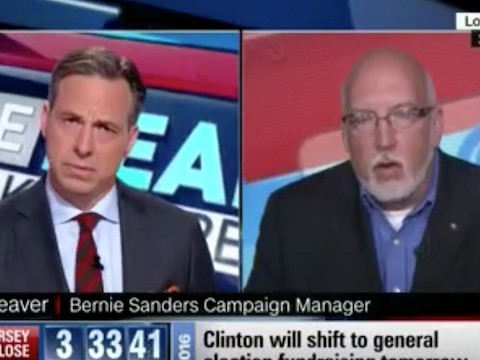Tuesday on CNN’s “The Lead,” host Jake Tapper questioned Democratic presidential candidate Sen. Bernie Sanders’ campaign manager Jeff Weaver about the campaign’s call for super delegates to override the will of the voter if his opponent, front-runner Hillary Clinton, ends up with the win in both pledged delegates and the popular vote in the presidential primary.
Partial transcript as follows:
TAPPER: It’s anticipated this evening Hillary Clinton will declare herself the presumptive nominee. If she ends up after the polls close winning the majority of pledge delegates and majority of endorsements from super delegates and does add up to the number needed to clinch the nomination, what is the Sanders campaign going to say?
WEAVER: Well, Jake, the truth of the matter is that super delegates, as you know, don’t vote until the convention. So there’s been a poll of super delegates, but it’s just a poll. They haven’t actually voted. In terms of the way the process works—we didn’t establish the process but we are playing by the rules given to us in the beginning—if you don’t have 2383 in the pledge delegates, go to the convention and super delegates will decide. Even though somebody may be ahead, they have not won if they have 2383 in pledge delegates, we have to wait to see what the super delegates do. Bernie Sanders is a much stronger in a general election against Donald Trump. We should get together and beat Trump and Bernie Sanders is a much stronger choice to do that.
TAPPER: You keep on talking about how you hope to get super delegates to switch their stated allegiance, you and Senator Sanders have been saying that for months. and only one super delegate has changed affiliation. And he went in the wrong direction. He’s now with Clinton. Do you have any reason to think that super delegates are going to switch?
WEAVER: Well look, the super delegate election is at the end of July. And like every voter, super delegates take a hard look at the race as to when they actually have to vote. Evidence is mounting. Senator Sanders has been much stronger in the second half of this race coming from 3% when he started in this race, 2.5 million individual contributors, over 10 million votes winning 20 states and obviously will probably win some more tonight. It’s a pretty strong case given where the public polling is and the need to defeat Trump and the Republicans.
TAPPER: But, Jeff, the argument you’re making is that super delegates should go against the majority of the poplar vote and pledge delegates, Clinton has received a total of 13 million, 27 votes, 55.6 votes. Sanders received 10 million, which is 42.7. why should super delegates go against what Democratic voters want?
WEAVER: Well, Jake, those numbers are a little deceptive because a lot of the states where Sanders won were in caucus states. If you extrapolate the population of those states compare those to similar size states that had primaries, that number gets much, much smaller, the difference between the two gets much smaller by millions. But the problem is — this is the way the process was established. This is the way the Democratic primary…
TAPPER: But super delegates have never gone against the will of the voters. they’ve never done that in the history of super delegates when they started, I think in 1982.
WEAVER: But that is their function, Jake, that’s their function.
TAPPER: Not to go against. They can vote however they want but not supposed to go against what the majority of voters want.
WEAVER: Well, if they weren’t supposed to do that they wouldn’t be there. They are there to make sure the party at the end of the day — I’m not saying this is the way we would have set it up but they’re supposed to make a judgment at the end of the process. If candidate hasn’t gotten the overwhelming number of delegates, 2383, which the secretary has not gotten, their job is to make sure they elect the strongest candidate in the fall.
TAPPER: You’re actually making an argument — you’re actually kind of making an argument in favor of the way this used to be done in like the ’50s with party bosses deciding what they want. Like Estes Kefauver got more votes when he ran against Adlai Stevenson but the guys in the smoke filled room picked Stevenson. You’re arguing in favor of a typical similar type situation.
WEAVER: I’m arguing that the process in 2016 should play out according to the rules that have been established for this contest. This is not the 1950s rules the 2016 rules. Not established by us, but we are playing by them. Do you want to talk about changing them in the future? I think we’re happy to engage in that conversation, but that’s not where we are right now.
TAPPER: But just to underline it, you will want super delegates to go against the will of the majority of voters assuming that Hillary Clinton has the majority when all the voting is over.
WEAVER: Well, Jake, how about this. Should super delegates from states where Bernie Sanders got 70% or 80% of the vote support Secretary Clinton or Bernie Sanders?
TAPPER: I think when you do that math it actually ends up that Hillary Clinton still wins.
WEAVER: Yeah, but you’re talking about a principle here. You just articulated a principle and I’m articulating a principle back to you. Should super delegates in states that overwhelmingly went for Hillary Clinton or Bernie Sanders —
TAPPER: I didn’t come up with your facacta rules, but you’re actually arguing in favor of something. Jeff. Let’s leave it on that note. We really appreciate it. Good luck on the primaries. Our best to Senator Sanders.
Follow Pam Key on Twitter @pamkeyNEN

COMMENTS
Please let us know if you're having issues with commenting.